Agriculture
Appearance
(Redirected from Farm)

But it’s not only our work that is future-oriented: so much of modern life is a tangle of social goals and often-impossible expectations shaping everything from our love-lives to our health. Hunter-gatherers, by contrast, only worked to meet their immediate needs; they neither held themselves hostage to future aspirations, nor claimed privilege on the basis of past achievements. ~ James Suzman
Agriculture, also called farming or husbandry, is the cultivation of animals, plants, fungi, and other life forms for food, fiber, biofuel, medicinals and other products used to sustain and enhance human life.
Quotes
[edit]A
[edit]
- Ten acres and a mule.
- American phrase indicating the expectations of emancipated slaves (1862): Quoted in Hoyt's New Cyclopedia Of Practical Quotations (1922), Lemma "Agriculture" p. 18-19.
Follow, poet, follow right
To the bottom of the night,
With your unconstraining voice
Still persuade us to rejoice;With the farming of a verse
Make a vineyard of the curse,
Sing of human unsuccess
In a rapture of distress;In the deserts of the heart
Let the healing fountains start,
In the prison of his days
Teach the free man how to praise.- W. H. Auden In Memory of W.B. Yeats (1939), Lines 66-77.
B
[edit]
- Three acres and a cow.
- Jeremy Bentham, Works, Volume VIII, p. 448. Quoted from Bentham by Lord Rosebery. Monologue on Pitt, in Twelve English Statesmen. Referred to by Sir John Sinclair Code of Agriculture, Miscellaneous Essays, 1802. Same idea in Defoe's Tour through the whole Islands of Britain, 6th Ed. Phrase made familiar by Hon. Jesse Collings in the House of Commons, 1886, "Small Holdings amendment": Quoted in Hoyt's New Cyclopedia Of Practical Quotations (1922), Lemma "Agriculture" p. 18-19..
- Virginia was in fact a landowning aristocracy, without nobility or merchant class, or any considerable small peasant farming class; and the other Southern colonies, except North Carolina, were on the whole similar to Virginia in these respects.
- Carl L. Becker The United States: An Experiment in Democracy (1920)
- Look up! the wide extended plain
Is billowy with its ripened grain,
And on the summer winds are rolled
Its waves of emerald and gold.- William Henry Burleigh, The Harvest Call, Stanza 5: Quoted in Hoyt's New Cyclopedia Of Practical Quotations (1922), Lemma "Agriculture" p. 18-19.
C
[edit]
- Cicero, 44 BC
- When you have decided to purchase a farm, be careful not to buy rashly; do not spare your visits and be not content with a single tour of inspection. The more you go, the more will the place please you, if it be worth your attention. Give heed to the appearance of the neighbourhood, - a flourishing country should show its prosperity. "When you go in, look about, so that, when needs be, you can find your way out."
- Cato the Elder De Agri Cultura, about 160 BC. Of buying a farm.
- Arbores serit diligens agricola, quarum adspiciet baccam ipse numquam.
- The diligent farmer plants trees, of which he himself will never see the fruit.
- Cicero, Tusculanarum Disputationum, I, 14: Quoted in Hoyt's New Cyclopedia Of Practical Quotations (1922), Lemma "Agriculture" p. 18-19.
- For of all gainful professions, nothing is better, nothing more pleasing, nothing more delightful, nothing better becomes a well-bred man than agriculture.
- Cicero, De Oficiis (44 BC), Book 1, section 42. Translation by Cyrus R. Edmonds (1873), p. 73.
- Oculos et vestigia domini, res agro saluberrimas, facilius admittit.
- He allows very readily, that the eyes and footsteps of the master are things most salutary to the land.
- Columella, De Re Rustica, IV. 18: Quoted in Hoyt's New Cyclopedia Of Practical Quotations (1922), Lemma "Agriculture" p. 18-19.
- We must plant the sea and herd its animals … using the sea as farmers instead of hunters. That is what civilization is all about — farming replacing hunting.
- Jacques-Yves Cousteau in Interview (17 July 1971); Cited in: Elizabeth Brubaker et al. (2008) Breath of Fresh Air, p. 180.
- Farming as we do it is hunting, and in the sea we act like barbarians.
- Jacques-Yves Cousteau in Interview (17 July 1971): Cited in: Jane Goodall et al. (2005) Harvest for Hope: A Guide to Mindful Eating.
D
[edit]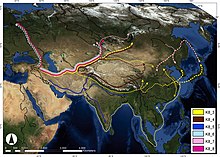
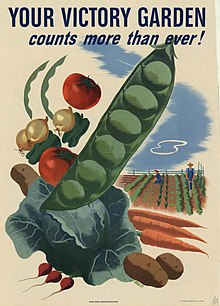
- Agriculture was launched in the Fertile Crescent by the early domestication of eight crops, termed "founder crops" (because they founded agriculture in the region and possibly in the world). Those eight founders were the cereals emmer wheat, einkorn wheat, and barley; the pulses lentil, pea, chickpea, and bitter vetch; and the fiber crop flax. Of these eight, only two, flax and barley, range in the wild at all widely outside the Fertile Crescent and Anatolia. Two of the founders had very small ranges in the wild, chickpea being confined to southeastern Turkey and emmer wheat to the Fertile Crescent itself. Thus, agriculture could arise in the Fertile Crescent from domestication of locally available wild plants, without having to wait for the arrival of crops derived from wild plants domesticated elsewhere. Conversely, two of the eight founder crops could not have been domesticated anywhere in the world except in the Fertile Crescent, since they did not occur wild elsewhere.
- Jared Diamond, Guns, Germs, and Steel: The Fates of Human Societies (1997), p. 141
- Aristotle, who has taught us most of the wise things we know, never said a wiser thing than that the cultivators of the soil are the class least inclined to sedition and to violent courses.
- Benjamin Disraeli, speech in the House of Commons (13 March 1865)
E
[edit]- The first farmer was the first man, and all historic nobility rests on possession and use of land.
- Ralph Waldo Emerson, Society and Solitude, Farming: Quoted in Hoyt's New Cyclopedia Of Practical Quotations (1922), Lemma "Agriculture" p. 18-19.
F
[edit]- Although no conclusive proof exists that GM cereals may be harmful to human beings, and in some regions their use has brought about economic growth which has helped to resolve problems, there remain a number of significant difficulties which should not be underestimated. In many places, following the introduction of these crops, productive land is concentrated in the hands of a few owners due to “the progressive disappearance of small producers, who, as a consequence of the loss of the exploited lands, are obliged to withdraw from direct production”. The most vulnerable of these become temporary labourers, and many rural workers end up moving to poverty-stricken urban areas. The expansion of these crops has the effect of destroying the complex network of ecosystems, diminishing the diversity of production and affecting regional economies, now and in the future. In various countries, we see an expansion of oligopolies for the production of cereals and other products needed for their cultivation. This dependency would be aggravated were the production of infertile seeds to be considered; the effect would be to force farmers to purchase them from larger producers.
- The farmer, the guy getting a sloppy-with-somewhat-processed-grass tail whipped across his face, the fellow squatting planting seeds he kept from last year, the fisherman on a wild and rolling sea… these are my people, my heroes and my role models. These are the builders, the makers. These are the foundation stone people on which my Australia and the US and Canada (yes there are others, but at least I know a little about those) were built, and still actually stand.
- Dave Freer, "Makers and Breakers" (2017)
- The ultimate goal of farming is not the growing of crops, but the cultivation and perfection of human beings.
- Masanobu Fukuoka The One-Straw Revolution (1975; published in English 1978 –page 119).
G
[edit]- We are returned to mystery and the power of cooperating with life—rather than, as so often now, working against it.
- Elsa Gidlow On organic farming, in Belasco, Warren James, 2007, "The Organic Paradigm", Appetite for Change: How the Counterculture Took on the Food Industry, Cornell University Press, ISBN 0801473292, p. 69.
- Oft did the harvest to their sickle yield:
Their furrow oft the stubborn glebe has broke:
How jocund did they drive their team a-field!
How bow'd the woods beneath their sturdy stroke!- Thomas Gray, Elegy in a Country Churchyard, Stanza 7: Quoted in Hoyt's New Cyclopedia Of Practical Quotations (1922), Lemma "Agriculture" p. 18-19.
H
[edit]


- As valuable as animal protein is, livestock are relatively inefficient protein-making machines. ...only 23 percent of the protein that a cow takes in ends up as usable protein in its meat or milk. Beef cattle pay back about 10 percent... while pigs return 12 percent. ...Grazing in a pasture, a 1,000-pound cow turns the grass into edible protein at the rate of about a pound a day. The same weight of bacterial organisms... produces 2,750 pounds of protein in the same "grazing" day. Bacteria are also less demanding... they do not care what the weather is and do not need as much personal attention...
- John F. Henahan, Men and Molecules (1966)
- There are now about 100,000 different types of protein-producing plants that are almost completely ignored as food staples. These unused protein suppliers are the fungi, which include the yeasts, mushrooms and molds. ...there are many carbohydrate-containing plants that can be used as food for fungus... in low-protein areas of the world. ...even wood pulp has been a fair starting material for the protein-manufacturing machinery of the Fungi Imperfecti. Dr. [William D.] Gray has calculated that if only seven major crops were converted into fungal protein, the protein would meet the yearly needs of more than four and a half billion people.
- John F. Henahan, Men and Molecules (1966)
- Farming here often reminds me of the man who when asked to embark upon some rather doubtful business venture replied that if he wanted to gamble he would prefer roulette,…where the chances were only 32 to 1 against him.
- Caroline Henderson, as quoted in The Dust Bowl, by Ken Burns, "Episode Guide", PBS, (2012).
- While early American society was an agrarian society, it was fast becoming more commercial, and commercial goals made their way among its agricultural classes almost as rapidly as elsewhere. The more commercial society became, however, the more reason it found to cling in imagination to the noncommercial agrarian values. The more farming as a self-sufficient way of life was abandoned for farming as a business, the more merit men found in what was being left behind. And the more rapidly the farmers' sons moved into the towns, the more nostalgic the whole culture became about its rural past. The American mind was raised upon a sentimental attachment to rural living and upon a series of notions about rural people and rural life that I have chosen to designate as the agrarian myth. The agrarian myth represents a kind of homage that Americans have paid to the fancied innocence of their origins.
Like any complex of ideas, the agrarian myth cannot be defined in a phrase, but its component themes form a clear pattern. Its hero was the yeoman farmer, its central conception the notion that he is the ideal man and the ideal citizen.- Richard Hofstadter The Age of Reform: from Bryan to F.D.R. (1955) Chapter I, part I (p. 23).
- Beatus ille qui procul negotiis,
Ut prisca gens mortalium,
Paterna rura bobus exercet suis,
Solutus omni fænore.- Happy he who far from business, like the primitive race of mortals, cultivates with his own oxen the fields of his fathers, free from all anxieties of gain.
- Horace, Epodon, Book II. 1: Quoted in Hoyt's New Cyclopedia Of Practical Quotations (1922), Lemma "Agriculture" p. 18-19.
- Ye rigid Ploughmen! bear in mind
Your labor is for future hours.
Advance! spare not! nor look behind!
Plough deep and straight with all your powers!- Richard Henry Horne, The Plough: Quoted in Hoyt's New Cyclopedia Of Practical Quotations (1922), Lemma "Agriculture" p. 18-19.
- The domestication of animals and plants took place thousands of years ago, with different forms springing up independently in different parts of the world at different times. The Fertile Crescent, China, India, Mesoamerica (central and southern Mexico and adjacent areas), the Andes of South America and the eastern United States all boasted food production from a very early time (Diamond, 2005).
- Arnold van Huis, Joost Van Itterbeeck, Harmke Klunder, Esther Mertens, Afton Halloran, Giulia Muirand, Paul Vantomme, “Edible insects Future prospects for food and feed security”,Food and Agriculture Organization of the United Nations Rome, 2013, Ch. 3 Culture, religion and the history of entomophagy, p.37-38
- The historical contexts in which plant and animal domestication have taken place should also be taken into account. The domestication of large animals (and plants) gave Europeans a considerable advantage over other regions, as evidenced by their worldwide conquests (Diamond, 2005).
- Arnold van Huis, Joost Van Itterbeeck, Harmke Klunder, Esther Mertens, Afton Halloran, Giulia Muirand, Paul Vantomme, “Edible insects Future prospects for food and feed security”,Food and Agriculture Organization of the United Nations Rome, 2013, Ch. 3 Culture, religion and the history of entomophagy, p.37-38
J
[edit]
- Cultivators of the earth are the most valuable citizens. They are the most vigorous, the most independant, the most virtuous, and they are tied to their country and wedded to it’s liberty and interests by the most lasting bands. As long therefore as they can find emploiment in this line, I would not convert them into mariners, artisans, or any thing else. But our citizens will find emploiment in this line till their numbers, and of course their productions, become too great for the demand both internal and foreign.
- Thomas Jefferson, letter to John Jay (August 23, 1785); reported in The Papers of Thomas Jefferson, ed. Julian P. Boyd (1953), vol. 8, p. 426.
- Earth is here so kind, that just tickle her with a hoe and she laughs with a harvest.
- Douglas Jerrold, A Land of Plenty (Australia): Quoted in Hoyt's New Cyclopedia Of Practical Quotations (1922), Lemma "Agriculture" p. 18-19.
- The life of the husbandman,—a life fed by the bounty of earth and sweetened by the airs of heaven.
- Douglas Jerrold, Jerrold's Wit, The Husbandman's Life: Quoted in Hoyt's New Cyclopedia Of Practical Quotations (1922), Lemma "Agriculture" p. 18-19.
- England is the only country in Europe that can boast of having improved its agriculture and the cultivation of its soil beyond that of any other European nation. The condition of English agriculture, compared with that of our own, is like light contrasted with shade.
- Johann Heinrich Gottlob Justi Von denen Hinternissen einer bluhenden Landwirtschaft, 1761.
K
[edit]- If farming were to be organised like the stock market, a farmer would sell his farm in the morning when it was raining, only to buy it back in the afternoon when the sun came out.
- Attributed to John Maynard Keynes by Hutton, Will (November 2, 2008). "Will the real Keynes stand up, not this sad caricature?". Guardian. Retrieved on 2009-02-05.
- All I saw before me were acres of skin… It was like a farmer seeing a fertile field for the first time.
- Albert Kligman as quoted in Allen M. Hornblum. Sentenced to Science: One Black Man's Story of Imprisonment in America, 2007, p. 52.
- In the early twenty-first century farming had all but died out here. We got our food from the supermarket, and not everybody cared where the supermarket got it as long as it was there on the shelves. A few elderly dairymen hung on. Many let their fields and pastures go to scrub. Some sold out to what used to be called developers, and they'd put in five or ten poorly build houses. Now, in the new times, there were far fewer people, and many houses outside town were being taken down for their materials. Farming was back. That was the only way we got food.
- James Howard Kunstler World Made By Hand (2008) Chapter 1, Page 5.
L
[edit]
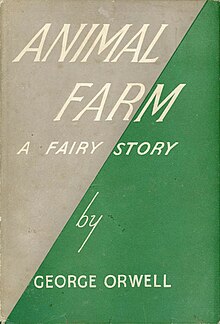
- Bread and beauty grow best together. Their harmonious integration can make farming not only a business but an art; the land not only a food-factory but an instrument for self-expression, on which each can play music to his own choosing.
- Aldo Leopold A Sand County Almanac, 1949 "The Conservation Ethic" [1933], p. 191.
- Your true modern is separated from the land by many middlemen, and by innumerable physical gadgets. He has no vital relation to it; to him it is the space between cities on which crops grow. Turn him loose for a day on the land, and if the spot does not happen to be a golf links or a ‘scenic’ area, he is bored stiff. If crops could be raised by hydroponics instead of farming, it would suit him very well. Synthetic substitutes for wood, leather, wool, and other natural land products suit him better than the originals. In short, land is something he has ‘outgrown.’
- Aldo Leopold A Sand County Almanac, 1949 “The Land Ethic”, p. 223-224.
- The status of women up to now has been compared to that of a slave; women have been tied to the home, and only socialism can save them from this. They will only be completely emancipated when we change from small-scale individual farming to collective farming and collective working of the land.
- Vladimir Lenin Collected Works, Vol. 28, pp. 180–182.
- The proletarian state must effect the transition to collective farming with extreme caution and only very gradually, by the force of example, without any coercion of the middle peasant.
- Vladimir Lenin Collected Works, Vol. 31, p. 157.
M
[edit]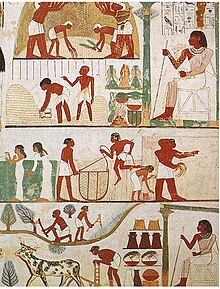

- Cujus est solum, ejus est usque ad cœlum.
- He who owns the soil, owns up to the sky.
- Law Maxim: Quoted in Hoyt's New Cyclopedia Of Practical Quotations (1922), Lemma "Agriculture" p. 18-19.
- Without competition we would be clinging to the clumsy antiquated processes of farming and manufacture and the methods of business of long ago, and the twentieth would be no further advanced than the eighteenth century.
- William McKinley Speech delivered at the Pan-American Exposition, Buffalo, New York (September 5, 1901).
- When the land is cultivated entirely by the spade, and no horses are kept, a cow is kept for every three acres of land.
- John Stuart Mill, Principles of Political Economy, Book II, Chapter VI, Section V. (Quoting from a treatise on Flemish husbandry): Quoted in Hoyt's New Cyclopedia Of Practical Quotations (1922), Lemma "Agriculture" p. 18-19.
- Adam, well may we labour, still to dress
This garden, still to tend plant, herb, and flower.- John Milton, Paradise Lost (1667; 1674), Book IX, line 205.
- It is certain that by a special dispensation of Providence in favor of those who make up the bulk of the human family, a man may secure a simple livelihood in agricultural pursuits, with less of energy, less of promptitude, less of calculation, and greater unthrift generally, than would be compatible with even this scanty aim, in any other calling of life.
- Donald Grant Mitchell, My Farm of Edgewood (1863), p. 277.
O
[edit]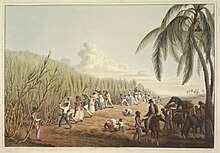
- Continua messe senescit ager.
- A field becomes exhausted by constant tillage.
- Ovid, Ars Amatoria, III. 82: Quoted in Hoyt's New Cyclopedia Of Practical Quotations (1922), Lemma "Agriculture" p. 18-19.
P
[edit]- La terre, elle, ne ment pas [The land, it does not lie].
- Philippe Pétain, speech (25 June 1940), quoted in Philippe Pétain, Discours aux Français, 17 juin 1940-20 août 1944 (Paris: Albin Michel, 1989), p. 66
- France will become again what she should never have ceased to be—an essentially agricultural nation. Like the giant of mythology, she will recover all her strength by contact with the soil.
- Philippe Pétain, speech (August 1940), quoted in Pavlos Giannelia, 'France Returns to the Soil', Land and Freedom, Vol. XLI, No. 1, January-February 1941, p. 23 and Eugen Weber, 'France', in Hans Rogger and Eugen Weber (eds.), The European Right: A Historical Profile (University of California Press, 1966), p. 113
- Majores fertilissium in agro oculum domini esse dixerunt.
- Our fathers used to say that the master's eye was the best fertilizer.
- Pliny the Elder, Historia Naturalis, XVIII. 84: Quoted in Hoyt's New Cyclopedia Of Practical Quotations (1922), Lemma "Agriculture" p. 18-19.
- Our rural ancestors, with little blest,
Patient of labour when the end was rest,
Indulg'd the day that hous'd their annual grain,
With feasts, and off'rings, and a thankful strain.- Alexander Pope, Second Book of Horace, Epistle I, line 241: Quoted in Hoyt's New Cyclopedia Of Practical Quotations (1922), "Lemma Agriculture" p. 18-19.
- Where grows?—where grows it not? If vain our toil,
We ought to blame the culture, not the soil.- Alexander Pope, An Essay on Man (1733-34), Epistle IV, line 13.
- Here Ceres' gifts in waving prospect stand,
And nodding tempt the joyful reaper's hand.- Alexander Pope, Windsor Forest (1713), line 39.
R
[edit]- One major problem in Africa from a capitalist viewpoint was how to induce Africans to become laborers or cash-crop farmers. In some areas, such as West Africa, Africans had become so attached to European manufactures during the early period of trade that, on their own initiative, they were prepared to go to great lengths to participate in the colonial money economy. But that was not the universal response. In many instances, Africans did not consider the monetary incentives great enough to justify changing their way of life so as to become laborer or cash-crop farmers. In such cases, the colonial state intervened to use law, taxation, and outright force to make Africans pursue a line favorable to capitalist profits. When colonial governments seized African lands, they achieved two things simultaneously. They satisfied their own citizens (who wanted mining concessions or farming land) and they created the conditions whereby landless Africans had to work not just to pay taxes but also to survive. In settler areas such as Kenya and Rhodesia the colonial government also prevented Africans from growing cash crops so that their labor would be available directly for the whites. One of the Kenya white settlers, Colonel Grogan, put it bluntly when he said of the Kikuyu: “We have stolen his land. Now we must steal his limbs. Compulsory labor is the corollary of our occupation of the country.”
- Walter Rodney, How Europe Underdeveloped Africa (1972), p. 165
- In recorded history, we’ve never even seen a family that’s lost their farm because of an estate tax. It just does not happen
- But that doesn’t hurt the imaginations of all these politicians who want to use the family farm as a straw man
- Steven Rosenthal, senior fellow at the Urban-Brookings Tax Policy Center "House Democrats’ plan drops repeal of a tax provision for inheritances" (September 14, 2021)
S
[edit]
- The adverse economic events following the First World War turned me toward economics... I learned during my youth how hard it was for farm families to stay solvent. Farm product prices fell abruptly by more than half. Banks went bankrupt and many farmers suffered foreclosures. Was politics or economics to blame? I opted for economics.
- Theodore Schultz, "Nobelprize.org: Autobiography," in: Nobel Lectures, Economics 1969-1980, Editor Assar Lindbeck, World Scientific Publishing Co., Singapore, 1992.
- Most people in the world are poor. If we knew the economy of being poor, we would know much of the economics that really matter. Most of the world's poor people earn their living in agriculture. If we knew the economics of agriculture, we would know much of the economic of being poor.
- Theodore W. Schultz, "Prize Lecture: The Economics of Being Poor," 1979; Republished at Nobelprize.org. Nobel Media AB 2013. Web. 25 Jun 2014.
- In 1905 Haber reached an objective long sought by chemists—that of fixing nitrogen from air. Atmospheric nitrogen, or nitrogen gas, is relatively inert and does not easily react with other chemicals to form new compounds. Using high pressure and a catalyst, Haber was able to directly react nitrogen gas and hydrogen gas to create ammonia. His process was soon scaled up by BASF’s great chemist and engineer Carl Bosch and became known as the Haber-Bosch process, considered by many as one of the most important technological advances of the 20th century. Haber’s breakthrough enabled mass production of agricultural fertilizers and led to a massive increase in growth of crops for human consumption.
- Science History Institute, ”Fritz Haber”, (December 7, 2017).
- In 1933, the Soviet and Nazi alternatives to democracy depended on their rejection of simple land reform, now the discredited pabulum of the failed democracies. Hitler and Stalin, for all of their many differences, presumed that one root of the problem was the agricultural sector, and that the solution was drastic state intervention. If the state could enact a radical economic transformation, that would then undergird a new kind of political system. The Stalinist approach, public since the beginning of Stalin’s Five-Year Plan in 1928, was collectivization. Soviet leaders allowed peasants to prosper in the 1920s, but took the peasants’ land away from them in the early 1930s, in order to create collective farms where peasants would work for the state. Hitler’s answer to the peasant question was just as imaginative, and just as well camouflaged. Before and even for a few years after he came to power in 1933, it appeared that Hitler was concerned above all with the German working class, and would address Germany’s lack of self-sufficiency in foodstuffs by means of imports. A policy of rapid (and illegal) rearmament removed German men from the unemployment rolls by placing them in barracks or in arms factories. Public works programs began a few months after Hitler came to power. It even appeared that the Nazis would do less for German farmers than they had indicated. Though the Nazi party program promised the redistribution of land from richer to poorer farmers, this traditional version of land reform was quietly tabled after Hitler became chancellor. Hitler pursued international agreements rather than redistributive agrarian policy. He sought special trade arrangements with east European neighbors, by which German industrial goods were in effect exchanged for foodstuffs. Hitler’s agricultural policy of the 1930s was a bit like Lenin’s of the 1920s: it was political preparation for a vision of almost unimaginably radical economic change. Both National Socialism and Soviet socialism baited peasants with the illusion of land reform, but involved far more radical plans for their future.
- Timothy D. Snyder, Bloodlands: Europe Between Hitler and Stalin (2010)
- And he gave it for his opinion, that whosoever could make two ears of corn or two blades of grass to grow upon a spot of ground where only one grew before, would deserve better of mankind, and do more essential service to his country, than the whole race of politicians put together.
- Jonathan Swift, Gulliver's Travels (1726) Voyage to Brobdingnag, Ch. 6.
How Neolithic farming sowed the seeds of modern inequality 10,000 years ago by James Suzman (2017)
[edit]- James Suzman, “How Neolithic farming sowed the seeds of modern inequality 10,000 years ago”, The Guardian, (5 Dec, 2017).
- The extraordinary productivity of modern farming techniques belies just how precarious life was for most farmers from the earliest days of the Neolithic revolution right up until this century (in the case of subsistence farmers in the world’s poorer countries). Both hunter-gatherers and early farmers were susceptible to short-term food shortages and occasional famines – but it was the farming communities who were much more likely to suffer severe, recurrent and catastrophic famines.
- Where hunter-gatherers saw themselves simply as part of an inherently productive environment, farmers regarded their environment as something to manipulate, tame and control. But as any farmer will tell you, bending an environment to your will requires a lot of work. The productivity of a patch of land is directly proportional to the amount of energy you put into it.
This principle that hard work is a virtue, and its corollary that individual wealth is a reflection of merit, is perhaps the most obvious of the agricultural revolution’s many social, economic and cultural legacies.
- The agricultural revolution also transformed the way humans think about time. Seeds are planted in spring to be harvested in autumn; fields are left fallow so they may be productive the following year. Thus farming-based societies created economies of hope and aspiration, in which we focus almost unerringly on the future, and where the fruits of our labour are delayed.
But it’s not only our work that is future-oriented: so much of modern life is a tangle of social goals and often-impossible expectations shaping everything from our love-lives to our health. Hunter-gatherers, by contrast, only worked to meet their immediate needs; they neither held themselves hostage to future aspirations, nor claimed privilege on the basis of past achievements.
Understanding how the agricultural revolution transformed human societies was once no more than a question of intellectual curiosity. Now, though, it has taken on a more practical and urgent aspect. Many of the challenges created by the agricultural revolution, such as the problem of scarcity, have largely been solved by technology – yet our preoccupation with hard work and unrestrained economic growth remains undimmed.
T
[edit]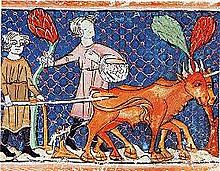
The Kings and awful Fathers of mankind:
And some, with whom compared your insect-tribes
Are but the beings of a summer's day,
Have held the Scale of Empire, ruled the Storm
Of mighty War; then, with victorious hand,
Disdaining little delicacies, seized
The Plough, and, greatly independent, scorned
All the vile stores corruption can bestow. ~ James Thomson
- In ancient times, the sacred Plough employ'd
The Kings and awful Fathers of mankind:
And some, with whom compared your insect-tribes
Are but the beings of a summer's day,
Have held the Scale of Empire, ruled the Storm
Of mighty War; then, with victorious hand,
Disdaining little delicacies, seized
The Plough, and, greatly independent, scorned
All the vile stores corruption can bestow.- James Thomson, The Seasons, Spring (1728), line 58.
- Ill husbandry braggeth
To go with the best:
Good husbandry baggeth
Up gold in his chest.- Thomas Tusser, Five Hundred Points of Good Husbandry, Chapter LII. Comparing Good Husbandry: Quoted in Hoyt's New Cyclopedia Of Practical Quotations (1922), Lemma "Agriculture" p. 18-19.
- Ill husbandry lieth
In prison for debt:
Good husbandry spieth
Where profit to get.- Thomas Tusser, Five Hundred Points of Good Husbandry, Chapter LII. Comparing Good Husbandry: Quoted in Hoyt's New Cyclopedia Of Practical Quotations (1922), Lemma "Agriculture" p. 18-19.
- He was a very inferior farmer when he first begun,… and he is now fast rising from affluence to poverty.
- Mark Twain, Rev. Henry Ward Beecher's Farm: Quoted in Hoyt's New Cyclopedia Of Practical Quotations (1922), Lemma "Agriculture" p. 18-19.
U
[edit]- There are some who call the USDA 'the last plantation.' An 'old line' department, USDA was one of the last federal agencies to integrate and perhaps the last to include women and minorities in leadership positions. Considered a stubborn bureaucracy and slow to change, USDA is also perceived as playing a key role in what some see as a conspiracy to force minority and socially disadvantaged farmers off their land through discriminatory loan practices.
- "Civil Rights at the United States Department of Agriculture: A Report by the Civil Rights Action Team", USDA, February 1997, p. 2; quoted in Mitchell (2001), p. 530.
V
[edit]- E'en in mid-harvest, while the jocund swain
Pluck'd from the brittle stalk the golden grain,
Oft have I seen the war of winds contend,
And prone on earth th' infuriate storm descend,
Waste far and wide, and by the roots uptorn,
The heavy harvest sweep through ether borne,
As the light straw and rapid stubble fly
In dark'ning whirlwinds round the wintry sky.- Virgil, Georgics (c. 29 BC), I, line 351. Sotheby's translation.
W
[edit]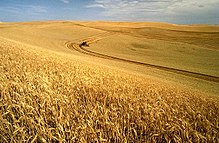

- Blessed be agriculture! if one does not have too much of it.
- Charles Dudley Warner, My Summer in a Garden, preliminary: Quoted in Hoyt's New Cyclopedia Of Practical Quotations (1922), Lemma "Agriculture" p. 18-19.
- When tillage begins, other arts follow. The farmers, therefore, are the founders of human civilization.
- Daniel Webster, Remarks on Agriculture, Jan. 13, 1840, p. 457: Quoted in Hoyt's New Cyclopedia Of Practical Quotations (1922), Lemma "Agriculture" p. 18-19.
- But let the good old corn adorn
The hills our fathers trod;
Still let us, for his golden corn,
Send up our thanks to God!- John Greenleaf Whittier, The Corn-Song: Quoted in Hoyt's New Cyclopedia Of Practical Quotations (1922), Lemma "Agriculture" p. 18-19.
- Heap high the farmer's wintry hoard!
Heap high the golden corn!
No richer gift has Autumn poured
From out her lavish horn!- John Greenleaf Whittier, The Corn-Song: Quoted in Hoyt's New Cyclopedia Of Practical Quotations (1922), Lemma "Agriculture" p. 18-19.
- I think the initial reason why I became interested in farming is that I wanted to be outdoors. I've always enjoyed being outdoors. And so, I looked around and when I was at high school, probably 14 or so, my parents through friends arranged for me to be able to go work on farms on the weekend.
Z
[edit]- Agriculture has been and remains a “catastrophe” at all levels, the one which underpins the entire material and spiritual culture of alienation now destroying us. Liberation is impossible without its dissolution.
- John Zerzan, Elements of Refusal (1988)


